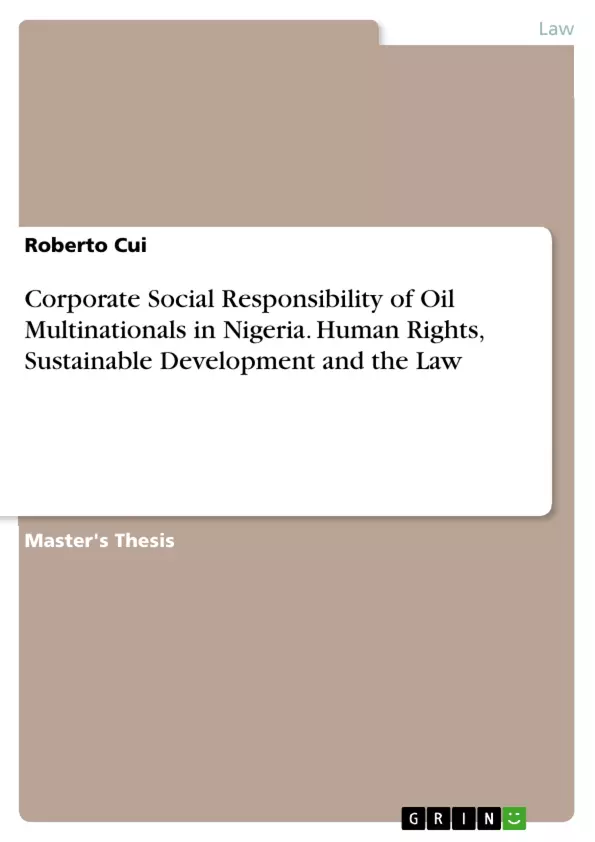Decades of irresponsible oil exploitation in the Niger Delta have caused a water and air pollution which does not have many comparisons anywhere else. In an already fragile country as Nigeria, characterised by weak democratic institutions and poor economic governance, this situation has led to increasing discontent and violence towards both the government and the oil multinationals. These two actors co-operate for the maximisation of oil profits and revenues while, at the same time, excluding local host communities from the participation in the oil development projects, preventing them to achieve a sustainable development, violating their Human Rights, and compromising their livelihoods.
This paper analyses the legal framework of Nigeria in the oil sector and the peculiarities of the country in order to provide a critical overview of the issues, demonstrating that the amendment of the domestic Acts dealing with the topic, as well as the remediation to the damages caused by the oil multinationals, are no longer deferrable. The final aim is to suggest a pattern to sustainable oil development which, by means of applying the concepts of Corporate Social Responsibility, would help to quell the conflict, to improve the standards of life of local people, and to make Nigeria emerge as a socio-environmentally responsible African resource-rich country.
Inhaltsverzeichnis (Table of Contents)
- Chapter 1: Introduction.
- 1. 1. The study..
- 1. 2. Aim and objectives.….….......
- 1. 3. Structure
- 1. 4. Contribution of the study
- Chapter 2: Methodology.
- Chapter 3: Literature Review....
- 3. 1. The debate on the legislative lacunas.
- 3. 2. The literature on Nigeria as a uniquely divided and conflicting country.
- 3. 3. The discourse about Human Rights
- 3. 4. CSR and sustainable development.
- Chapter 4: Legislative instruments currently in force in Nigeria .....
- 4. 1. National legislation
- 4.1.1. The Land Use Act (LUA) 1978.
- 4.1.2. The Oil Pipelines Act (OPA) 1956 and the Petroleum (Drilling and Production) Regulations 1969.
- 4.1.3. Companies and Allied Matters Act (CAMA) 1990.
- 4.1.4. Petroleum Industry Bill (PIB) 2007-2012...
- 4. 2. Niger Delta Development Commission (NDDC) (Establishment, etc.) Act 2000....
- 4. 3. International instruments.
- 4. 4. Concluding remarks
- Chapter 5: Discussion of the Issues. Oil, environment, and Human Rights …………………….
- 5. 1. Ethnicity, oil, displacement.
- 5. 2. Environment. The unsustainability of oil development in Nigeria .….………………….
- 5. 3. The Human Rights performance
- 5.3.1. International standards and domestic non-compliance.
- 5.3.2. Oil Multinational Corporations complicity in human rights violations
- 5. 4. Concluding remarks
- Chapter 6: CSR as a tool for sustainable development.........
- 6. 1. Self-Regulation and legal regulation........
- 6. 2. Participation and Empowerment of local communities
- Chapter 7: Conclusion. The Corporate Social (shared) Responsibility..
- 7. 1. The government's responsibility..
- 7.2. The oil MNCs' responsibility..
- 7.3. The communities' responsibility.
Zielsetzung und Themenschwerpunkte (Objectives and Key Themes)
This paper examines the complex relationship between oil multinationals, human rights, and sustainable development in Nigeria, focusing on the Niger Delta region. It aims to analyze the legal framework governing the oil sector and highlight the challenges posed by decades of irresponsible oil exploitation. The paper explores the impact of oil extraction on local communities, including displacement, environmental degradation, and human rights violations.
- The legal framework governing the oil sector in Nigeria.
- The socio-environmental consequences of oil exploitation in the Niger Delta.
- The impact of oil extraction on local communities and their human rights.
- The role of Corporate Social Responsibility (CSR) in promoting sustainable development.
- The potential for conflict resolution and improved livelihoods through responsible oil development.
Zusammenfassung der Kapitel (Chapter Summaries)
- Chapter 1: Introduction. This chapter introduces the study, outlines its objectives and structure, and emphasizes its contribution to the understanding of the complex relationship between oil, human rights, and sustainable development in Nigeria.
- Chapter 2: Methodology. This chapter describes the research methodology employed in the study, providing insights into the data collection and analysis methods used to explore the chosen topic.
- Chapter 3: Literature Review. This chapter reviews existing literature on the legal lacunas in the oil sector, the unique challenges faced by Nigeria, the discourse on human rights, and the relationship between CSR and sustainable development.
- Chapter 4: Legislative instruments currently in force in Nigeria. This chapter provides a detailed analysis of the relevant national legislation, including the Land Use Act, the Oil Pipelines Act, the Companies and Allied Matters Act, and the Petroleum Industry Bill. It also examines international instruments relevant to the study.
- Chapter 5: Discussion of the Issues. Oil, environment, and Human Rights. This chapter examines the complex issues surrounding oil exploitation in Nigeria, including the impact on local communities, the environmental consequences, and the human rights violations that have occurred.
- Chapter 6: CSR as a tool for sustainable development. This chapter explores the potential of CSR to promote sustainable development in the Niger Delta, focusing on self-regulation, legal regulation, and the empowerment of local communities.
Schlüsselwörter (Keywords)
This paper explores the crucial intersection of human rights, sustainable development, and the law in the context of oil multinational operations in Nigeria. It delves into the legal framework surrounding the oil sector, examines the impact of oil extraction on the Niger Delta region, and analyzes the role of Corporate Social Responsibility (CSR) in mitigating negative consequences. Key terms include: oil multinationals, Niger Delta, human rights violations, environmental degradation, sustainable development, CSR, legal framework, and conflict resolution.
- Quote paper
- Roberto Cui (Author), 2014, Corporate Social Responsibility of Oil Multinationals in Nigeria. Human Rights, Sustainable Development and the Law, Munich, GRIN Verlag, https://www.grin.com/document/282681



